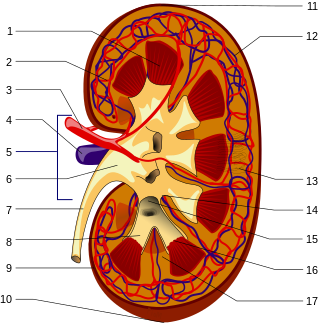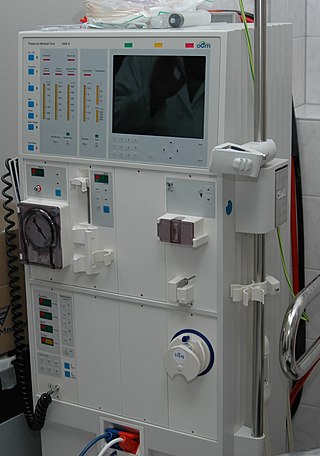
Nephrology is a specialty of adult internal medicine and pediatric medicine that concerns the study of the kidneys, specifically normal kidney function and kidney disease, the preservation of kidney health, and the treatment of kidney disease, from diet and medication to renal replacement therapy. The word “renal” is an adjective meaning “relating to the kidneys”, and its roots are French or late Latin. Whereas according to some opinions, "renal" and "nephro" should be replaced with "kidney" in scientific writings such as "kidney medicine" or "kidney replacement therapy", other experts have advocated preserving the use of renal and nephro as appropriate including in "nephrology" and "renal replacement therapy", respectively.

Kidney dialysis is the process of removing excess water, solutes, and toxins from the blood in people whose kidneys can no longer perform these functions naturally. This is referred to as renal replacement therapy. The first successful dialysis was performed in 1943.

Kidney failure, also known as end-stage kidney disease, is a medical condition in which the kidneys can no longer adequately filter waste products from the blood, functioning at less than 15% of normal levels. Kidney failure is classified as either acute kidney failure, which develops rapidly and may resolve; and chronic kidney failure, which develops slowly and can often be irreversible. Symptoms may include leg swelling, feeling tired, vomiting, loss of appetite, and confusion. Complications of acute and chronic failure include uremia, hyperkalaemia, and volume overload. Complications of chronic failure also include heart disease, high blood pressure, and anaemia.

Chronic kidney disease (CKD) is a type of kidney disease in which a gradual loss of kidney function occurs over a period of months to years. Initially generally no symptoms are seen, but later symptoms may include leg swelling, feeling tired, vomiting, loss of appetite, and confusion. Complications can relate to hormonal dysfunction of the kidneys and include high blood pressure, bone disease, and anemia. Additionally CKD patients have markedly increased cardiovascular complications with increased risks of death and hospitalization.

Alport syndrome is a genetic disorder affecting around 1 in 5,000-10,000 children, characterized by glomerulonephritis, end-stage kidney disease, and hearing loss. Alport syndrome can also affect the eyes, though the changes do not usually affect vision, except when changes to the lens occur in later life. Blood in urine is universal. Proteinuria is a feature as kidney disease progresses.

Nature Reviews Nephrology is a monthly peer-reviewed review journal published by Nature Portfolio. It was established as Nature Clinical Practice Nephrology in 2005, but change name in 2009. The editor-in-chief is Susan Allison.
Renal osteodystrophy/adynamic bone disease is currently defined as an alteration of bone morphology in patients with chronic kidney disease (CKD). It is one measure of the skeletal component of the systemic disorder of chronic kidney disease-mineral and bone disorder (CKD-MBD). The term "renal osteodystrophy" was coined in 1943, 60 years after an association was identified between bone disease and kidney failure.
Open access citation advantage (OACA), sometimes known as FUTON bias, is a type of bias whereby scholars tend to cite academic journals with open access (OA)—that is, journals that make their full text available on the Internet without charge —in preference to toll-access publications. The concept was introduced, under the FUTON bias name, by UK medical researcher Reinhard Wentz in a letter to The Lancet in 2002.
In nephrology, dialysis adequacy is the measurement of renal dialysis for the purpose of determining dialysis treatment regime and to better understand the pathophysiology of renal dialysis. It is an area of considerable controversy in nephrology.

Robert Provenzano is an American nephrologist. He is also an Associate Clinical Professor of Medicine at Wayne State University School of Medicine.
Vidya Jyothi Mohamed Hussain Rezvi Sheriff, FRCP (Lon), FRCPE (Edin), FRACP, FCCP, FSLCGP, FNASSL is a Sri Lankan academic, nephrologist and physician. He served as the director of the Postgraduate Institute of Medicine; senior professor of medicine; head of the Department of Clinical Medicine at the Faculty of Medicine, University of Colombo. He is currently serving as the Senior Professor of Medicine at General Sir John Kotelawala Defence University. He is also a consultant physician and nephrologist at National Hospital Sri Lanka. He is widely regarded as the Father of Nephrology or either hailed as Father of Modern Nephrology and Dialysis. He masterminded and pioneered kidney transplantation in Sri Lanka. He is also the founder and owner of Western Hospital.
Kamyar Kalantar-Zadeh is an Iranian-American physician doing research in nephrology, kidney dialysis, nutrition, and epidemiology. He is best known as a specialist in kidney disease nutrition and chronic kidney disease and for his hypothesis about the longevity of individuals with chronic disease states, also known as reverse epidemiology including obesity paradox. According to this hypothesis, obesity or hypercholesterolemia may counterintuitively be protective and associated with greater survival in certain groups of people, such as elderly individuals, dialysis patients, or those with chronic disease states and wasting syndrome (cachexia), whereas normal to low body mass index or normal values of serum cholesterol may be detrimental and associated with worse mortality. Kalantar-Zadeh is also known for his expertise in kidney dialysis therapy, including incremental dialysis, as well as renal nutrition. He is the brother of Kourosh Kalantar-zadeh, who an Australian scientist involved in research in the fields of materials sciences, nanotechnology, and transducers.

The European Renal Association (ERA) is an organisation for clinicians and scientists in nephrology, dialysis, renal transplantation and related areas.

Carmine Zoccali is an Italian nephrologist and a clinical investigator. He has contributed to research in several fields, most notably hypertension and cardiovascular complications in chronic kidney disease (CKD), CKD progression and clinical epidemiology of kidney diseases at large. He is known for his studies on cardiovascular risk in CKD and dialysis patients. He was among the earliest investigators that focused on the relevance of endothelial dysfunction and inflammation for the high risk of cardiovascular disease in these populations. In this research area, he was the first to link endogenous inhibitors of the nitric oxide system with death and cardiovascular disease. and the first to document a relationship between sympathetic over-activity and these outcomes Dr Zoccali is a practicing specialist in Nephrology, with a national qualification for the full professorship in Nephrology. He is also a specialist in hypertension, certified by the European Society of Hypertension (ESH).

Sunil Shroff is the managing trustee of a non-government and non-profit organisation called MOHAN Foundation and is well known for his work in the field of deceased donation transplantation in India. He has worked towards improving the deceased organ donation rate in India.
Ramesh Kumar MRCP, FRCP is the first Indian Member of Royal College of Physicians (MRCP in Kidney diseases and a pioneer of nephrology in India and South Asia. He was awarded the Padma Shri in 1992 and the Padma Bhushan in 2003 by the president of India for his pioneering, notable and continued contributions to Nephrology.
Sree Bhushan Raju M.D., D.M., Diplomate of National Board, is a nephrologist from Telangana, India. He is currently professor and head, Dept of Nephrology, Nizam's Institute of Medical Sciences Panjagutta, Hyderabad. Which is one of the largest teaching Department in India having eight DM seats. He is one of the principal investigators of CKD task force by Indian Council of Medical Research (ICMR) to evaluate the prevalence of CKD in adult urban population in India.

Professor John Stewart Cameron, known as Stewart, is a British nephrologist.
The Polish Society of Nephrology is a non-profit medical-scientific association, established in 1983, with a current headquarters in Warsaw that unites nephrologists, physicians and other scholars, experts and professionals in the fields of kidney diseases, dialysis therapy and renal transplantation.

Mark Dominik Alscher is a German physician, managing director of Bosch Health Campus Stuttgart and distinguished professor at University of Tübingen. He is known for his work in the field of peritoneal dialysis, acute renal failures and medical expert systems.












